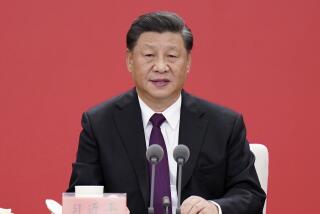China adds new voice to global lineup of English-language TV news channels
- Share via
Reporting from Beijing — The crowded market for English-language foreign news is making room for a surprising new player: CNC World, a 24-hour television news channel launched by the New China News Agency, or Xinhua, China’s main news service.
In launching a “new source of information for global audiences,” CNC apparently wants to be an English-language alternative to the dominant narratives of Western media, such as the BBC, CNN and certainly Fox. CNC will be broadcast in the Asia-Pacific region, Europe, North America and Africa.
“An international vision with a China perspective” is how Li Congjun the news service’s president, described the channel in an article carried by the news agency Thursday, the official date of the launch.
Critics are skeptical that CNC World will be taken seriously by international audiences.
“I don’t think they can win the hearts and minds of the Western people,” said Michael Anti, a Chinese blogger and media critic. “Freedom of speech is like air to [North Americans], but Xinhua is still part of China’s propaganda machine.”
However, CNC World does stand to make inroads in the developing world, where freedom of speech and democracy have not been as strongly established and where Western news media do not hold the same dominance, Anti said.
“After the success story of Al Jazeera in English, China planned to have some kind of media with world influence but still with their own agenda,” he said, referring to the Qatar-based satellite TV channel.
Influencing Africa’s emerging market has been of particular interest to China. The country has invested significantly in infrastructure projects across the continent, including railways in oil-rich Nigeria and in Angola, which has copper reserves.
The New China News Agency was launched in 1931 under the name Red China News Agency. The most prominent reporting agency in China, it is the “eyes and tongue” of the Communist Party, providing official statements on news and policy as well as setting a tone for the rest of the Chinese news media.
CNC World’s U.S. newsroom will be in New York’s Times Square, near such media giants as Conde Nast, the New York Times, Reuters and News Corp.
This is not China’s first foray into international broadcast media. CCTV News, a state-owned, 24-hour English-language channel with international reach, was launched in 2000. It is readily available in Los Angeles. It also broadcasts abroad in Spanish, French, Arabic and Russian.
Last month, the Southern Daily Group, which publishes one of the most influential liberal newspapers in China, the Southern Metropolis Daily, made a bid to purchase Newsweek magazine. Though the bid was unsuccessful, it was reported that the Southern Daily Group’s senior management was “expecting to make other similar purchases.”
State media in China fall into two categories, neixuan or waixuan — internal and external propaganda. The latter takes more of a public relations approach than do domestic media, which are often known for restricted coverage and occasional blackouts.
Though CNC World will be broadcast globally, Chinese viewers will not be able to see it.
“Not being accessible in China is one of CNC World’s main flaws,” noted Yu Guoming, a journalism professor at People’s University in Beijing. “There are many Chinese who know English or who are learning it, and there are foreigners in China who could benefit from the news service too.”
The new channel poses little threat to international news agencies such as CNN or the BBC, but ensuring the profitability of CNC World does not seem to be a major concern.
“It’s all part of a larger political purpose,” Anti said.
China often criticizes Western media for portraying it in an excessively unfavorable manner.
But in a climate of censorship and with the calculated loosening of restrictions, the English-language Chinese media have gained a reputation for more uncompromising coverage than domestic media.
“We always joke, if you really want to know China, you should read English news, even if it’s from Xinhua,” Anti said.
Frank is a staff writer in The Times’ Beijing Bureau.
More to Read
Sign up for Essential California
The most important California stories and recommendations in your inbox every morning.
You may occasionally receive promotional content from the Los Angeles Times.










